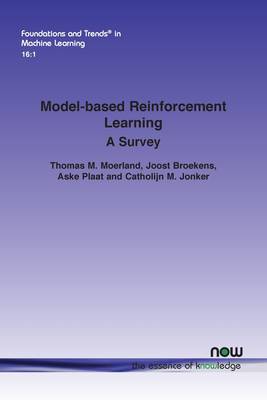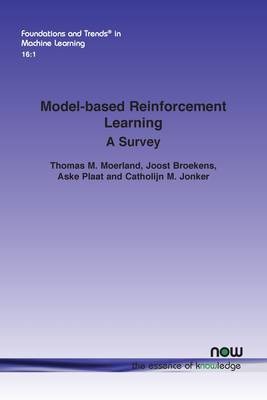
- Afhalen na 1 uur in een winkel met voorraad
- Gratis thuislevering in België vanaf € 30
- Ruim aanbod met 7 miljoen producten
- Afhalen na 1 uur in een winkel met voorraad
- Gratis thuislevering in België vanaf € 30
- Ruim aanbod met 7 miljoen producten
Zoeken
Model-Based Reinforcement Learning
A Survey
Thomas M Moerland, Joost Broekens, Aske Plaat, Catholijn M Jonker
€ 122,45
+ 244 punten
Omschrijving
Sequential decision making, commonly formalized as Markov Decision Process (MDP) optimization, is an important challenge in artificial intelligence. Two key approaches to this problem are reinforcement learning (RL) and planning. This monograph surveys an integration of both fields, better known as model-based reinforcement learning. Model-based RL has two main steps: dynamics model learning and planning-learning integration. In this comprehensive survey of the topic, the authors first cover dynamics model learning, including challenges such as dealing with stochasticity, uncertainty, partial observability, and temporal abstraction. They then present a systematic categorization of planning-learning integration, including aspects such as: where to start planning, what budgets to allocate to planning and real data collection, how to plan, and how to integrate planning in the learning and acting loop. In conclusion the authors discuss implicit model-based RL as an end-to-end alternative for model learning and planning, and cover the potential benefits of model-based RL. Along the way, the authors draw connections to several related RL fields, including hierarchical RL and transfer learning. This monograph contains a broad conceptual overview of the combination of planning and learning for Markov Decision Process optimization. It provides a clear and complete introduction to the topic for students and researchers alike.
Specificaties
Betrokkenen
- Auteur(s):
- Uitgeverij:
Inhoud
- Aantal bladzijden:
- 130
- Taal:
- Engels
- Reeks:
Eigenschappen
- Productcode (EAN):
- 9781638280569
- Verschijningsdatum:
- 4/01/2023
- Uitvoering:
- Paperback
- Formaat:
- Trade paperback (VS)
- Afmetingen:
- 156 mm x 234 mm
- Gewicht:
- 195 g

Alleen bij Standaard Boekhandel
+ 244 punten op je klantenkaart van Standaard Boekhandel
Beoordelingen
We publiceren alleen reviews die voldoen aan de voorwaarden voor reviews. Bekijk onze voorwaarden voor reviews.











